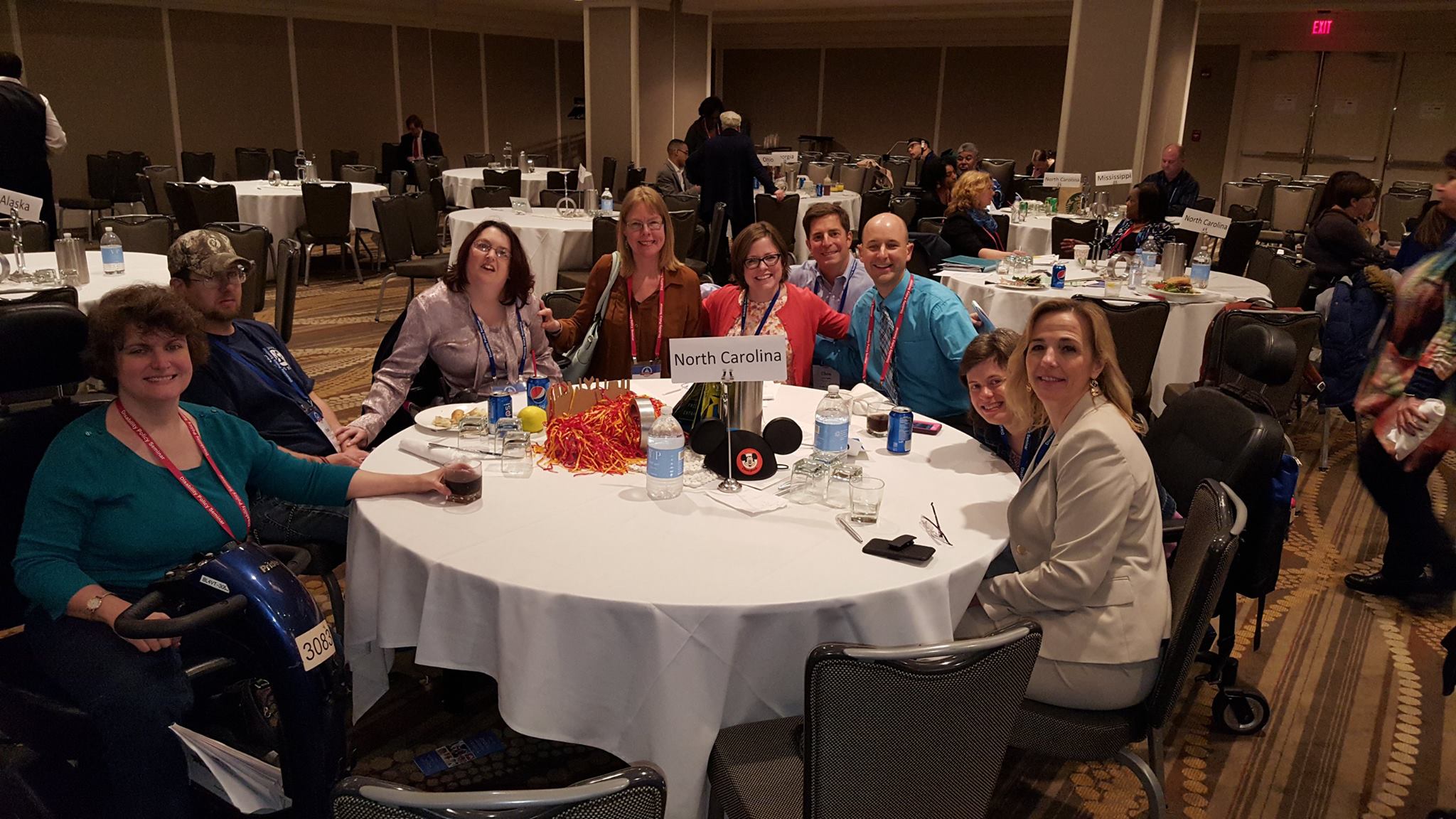April 2016: Highlights and Hot Topics

April 2016 Highlights & Hot Topics
Download a pdf of the April newsletter here.
A Message from Our Executive Director
It's an election year, and we note that in the United States there are 36 million eligible voters with disabilities. In 2012, only 15.6% of voters with disabilities cast ballots. What a huge opportunity we have to encourage people to exercise their rights and have influence over their future! We've felt the momentum about the future of people with disabilities build over this past year with the celebration of the 25th anniversary of the Americans with Disabilities Act. Awareness and discussion about disabilities has increased – now it's time for action to move us forward.
Our North Carolina House and Senate convened, and what better way for them to kick off the session than with hundreds of notes, e-mails and phone messages reminding our legislators to keep people with disabilities, their needs and priorities in the forefront while thanking them for their recent work on the ABLE Act.
Now is the time for you to let your representatives and senators know what you are passionate about, your concerns, and your suggestions about solutions including a focus on increasing financial and asset development, increasing community living, and increasing the opportunities for advocacy development - our Five Year Plan goals.
Find your legislators at http://www.nccdd.org/public-policy/take-action-now.html and connect with them today! Need ideas on what to say? We have those too at http://www.nccdd.org/general-content/186-writing-to-a-member-of-congress.html.
Speaking of increased awareness, remember that April is National Autism Awareness Month. Did you know:
· 1 in 68 children in America show autism prevalence.
· Every 20 minutes, someone in the world is diagnosed with autism.
· Boys are four times more likely to have autism than girls.
But did you also know:
· Early intervention is key in helping children with autism make progress.
· Autism is treatable, not a hopeless condition.
· About $169 million from the National Institutes of Health's budget goes towards autism research.
Autism is one of only three health issues to be recognized with its own day by the United Nations. And our advocacy has to continue to bring autism, and all other intellectual and developmental disabilities, to the forefront so we can continue to advocate for better services and supports.
Chris Egan
Executive Director
On April 1, 2016, Governor Pat McCrory unveiled his budget priorities for the coming year. Several priorities related to strengthening and supporting individuals and families, including funds for housing for adults with mental illness or substance use disorders and expansion of supports for adults with Alzheimer's.
There were other priorities more directly related to individuals with intellectual and developmental disabilities (I/DD). With a proposed expansion of Medicaid services, an additional 250 Innovations Waiver slots would be added. In an initiative to ensure coverage of autism interventions through Medicaid, the Department of Health and Human Services will issue guidance to Local Management Entity - Managed Care Organizations (LME/MCO) to utilize Early Periodic Screening Diagnosis and Treatment (EPSDT) to provide services and a Medicaid State Plan Amendment that outlines intensive treatments will be developed.
Other related priorities include an increase of 400 Pre-K slots which increase access to high-quality education for at-risk four-year-olds and limited availability of case management services for children who are dually diagnosed with intellectual disabilities and behavioral health needs. The Governor's budget is only the beginning of the budget process, but it was good to see priorities include support for individuals with I/DD. We will monitor the budget process over the course of the short session.
2016 Disability Policy Seminar
 In mid April, four Council members, Council staff and over 20 advocates from North Carolina joined hundreds of advocates across the country at this year's Disability Policy Seminar (DSP) in Washington, DC. NCCDD spent two and a half days learning current federal policy issues from experts, including self-advocates, organizational leaders and congressional staff. Many of the current issues before Congress align with NCCDD's Five-Year Strategic Plan goals and objectives. Given the Council's mission to educate and inform, our delegation spent the last day meeting with Senate and House members and their staff. Many thanks to Senator Burr and Representative Butterfield for personally meeting with our delegation. Additional thanks to the hardworking staff of Senator Tillis and Representatives Price, Holding, Jones and Pittenger for meeting and engaging in meaningful discussions to improve the lives of individuals with I/DD in North Carolina.
In mid April, four Council members, Council staff and over 20 advocates from North Carolina joined hundreds of advocates across the country at this year's Disability Policy Seminar (DSP) in Washington, DC. NCCDD spent two and a half days learning current federal policy issues from experts, including self-advocates, organizational leaders and congressional staff. Many of the current issues before Congress align with NCCDD's Five-Year Strategic Plan goals and objectives. Given the Council's mission to educate and inform, our delegation spent the last day meeting with Senate and House members and their staff. Many thanks to Senator Burr and Representative Butterfield for personally meeting with our delegation. Additional thanks to the hardworking staff of Senator Tillis and Representatives Price, Holding, Jones and Pittenger for meeting and engaging in meaningful discussions to improve the lives of individuals with I/DD in North Carolina.
Want to learn more? You can access the fact sheets and presentations from the Disability Policy Seminar, and get more in depth information on all topics that were covered. Check out pictures of NCCDD council members and staff with elected officials and their staff during our time in Washington, DC!
They are among 70 who are interning at nine sites, primarily hospitals, throughout North Carolina through Project SEARCH, a model launched in 1996 in Cincinnati.
Funding several of the North Carolina programs has been the North Carolina Council on Developmental Disabilities. The council, a stand-alone state agency mandated and funded by the federal government, works to give people with disabilities and their families access to – and a voice in shaping – services and support they need. - See more at: http://nccdd.org/news-media/in-the-news/335-triangle-business-journal-hospital-partnership-aids-individuals-with-disabilities.html#sthash.40OFSeU0.dpuf
Council Member Spotlight: Clare Shocket
Warm and enthusiastic, Clare Shocket is a passionate family advocate for youth with and without disabilities. Her personal journey began when her son, the youngest of four, came to her in second grade with concerns that he felt different. Shocket, being the supportive mother she is, acknowledged his uniqueness and said she was not overly concerned, but if he wanted to, they could explore it with a doctor. 
Her son persisted, and when they honored his request, the doctor diagnosed him with Tourette Syndrome as well as Congenital Adrenal Hyperplasia. In the years following, Shocket's journey into advocacy was both deep and broad. Of course, there were many lessons to be learned as she navigated the medical field, from dealing with insurance to exploring new therapies.
Shocket felt it was her role to not only be at the forefront of research but also to lead the conversation with the medical professionals that supported their family. With time, Shocket and her son uncovered the right approach for him. One that emphasized Habit Reversal Therapy in tandem with Acceptance and Commitment Therapy to renegotiate the tics.
At the same time Shocket was exercising her advocacy skills in the medical community, her family also fell into other advocacy opportunities at the local, state and national levels.
She was one of the initial members in the local chapter of the Tourette Syndrome Association to pilot the Youth Ambassador Program, one that trained people diagnosed with Tourette's and their loved ones to speak in school settings to educate other students around the syndrome and their experiences. Furthermore, she brought in nationally renowned professionals to train and re-educate teachers, faculty and staff in the Wake County school system.
Shocket comments, "It really is about education and enabling teachers to gain the knowledge so that they can pass that understanding on to the kids. In my experience, my journey of advocacy had a domino effect. We began locally, and through my work with the Tourette Association, we were able to connect with a writer interested in doing an exposé on Tourette Syndrome. As it turns out, this was later picked up by the Associated Press and Newsweek magazine. Of course, after all of that, I began fielding calls from other parents whose children were impacted by Tourette's, and it all just rolled from there."
As Shocket's son moved into junior high and high school, his interest in advocacy has waned slightly as his personal interest in music and theatre has taken rise. Yet, through this transition, Shocket has discovered a fine balance of honoring his personal wishes and interests while maintaining and pursuing her own interests. As her son enters adulthood and prepares to move to UNC for college, Shocket has rediscovered the time and space to re-imagine her own career.
Today, she's the executive director for the Youth Advocacy and Involvement Office under the Department of Administration and works with young people in high school and college to help them discover their own voice.
Within the I/DD community, her interest still remains on education through finding fresh and innovative ways to communicate the similarities of those impacted by disabilities to the general public.
Where once she wondered how her own son would fare as an adult, she has come to realize that the issues she anticipated having to deal with when he was young are far from the reality that life experience has brought him. It is her desire that, through new modes of communication, her involvement with the Council may lead to new ways to shift the public perception of the I/DD community and what potential lies within it.
For information on the Tourette Association of America, visit: http://tourette.org.
NCCDD Seeks Applications for Council Members
The North Carolina Council on Developmental Disabilities (NCCDD) is seeking applicants for endorsement to the Governor for appointment to NCCDD. Our continued commitment is to have a Council that represents the diversity of NC. Upon review, the application for endorsement will be presented to the Office of the Governor for approval for Council service in July 2016. The governor-appointed Council is made up of people with intellectual and other developmental disabilities (I/DD), their family members, various agency representatives and others. The NCCDD works on behalf of over 185,000 people with I/DD living in NC. The work of the Council is directed to help communities become more inclusive of people with I/DD and their families.
All applicants must complete and submit the application for endorsement and the application for board and commissions for consideration of endorsement to the Office of the Governor.
● Application for Endorsement to the Governor for Appointment to the North Carolina Council on Developmental Disabilities: PDF - Word Document - Online Application
● Application for Board and Commissions: PDF
Interested applicants should complete the following applications no later than May 15, 2016.
NC DVRS Opens Grant for Comprehensive Employment Support Services for Persons with Brain Injuries
The North Carolina Division of Vocational Rehabilitation Services (NC DVRS) is soliciting contractors to provide brain injury support services to eligible Division consumers that have been diagnosed with significant brain injuries and those whose injuries impact their ability to pursue successful employment goals. Deadline is May 9, 2016.
For more information about the Request for Applications (RFA), visit: http://bit.ly/26hqHlZ
If you would like to receive a copy of the RFA, please send an email request to the following email address: [email protected]